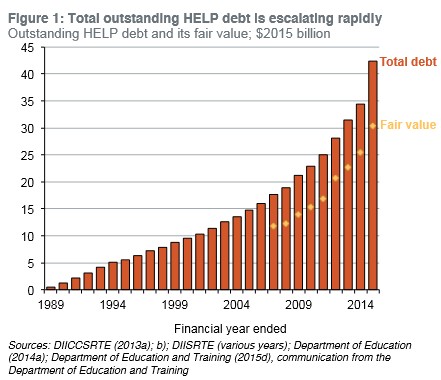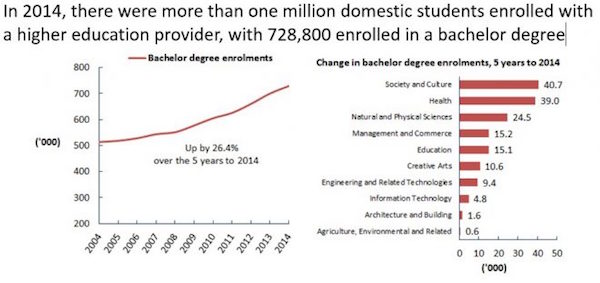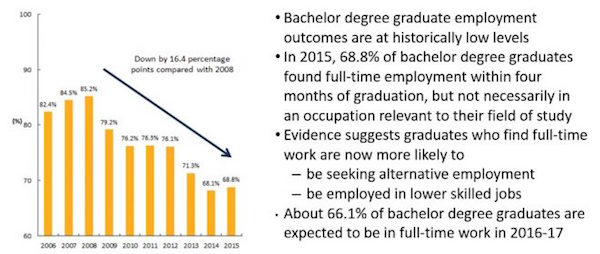Lambert here: It looks like the United States isn’t the only country to have credentialism and corruption problems in its universities; or too few jobs chasing too much student debt.
By Leith van Onselen, an economist who has previously worked at the Australian Treasury, Victorian Treasury, and Goldman Sachs. Originally published at MacroBusiness.
I have complained previously that Australia’s universities have turned into ‘degree factories’, whereby they teach as many students as possible to accumulate Commonwealth government funding through HELP/HECS debts. At the same time, quality of teaching, and students’ ability to secure subsequent employment, remain distant priorities.
This view is evidenced by the escalation of total outstanding HELP loans, much of which will never be repaid, putting increasing pressures on the federal Budget:

As well as the dramatic lowering of university entrance scores, suggesting that every person and their dog can now get a degree, devaluing their worth.
Indeed, the Department of Employment’s latest skills shortages report showed there were a record 1 million domestic students enrolled in a bachelor degree:

However, bachelor degree graduate employment outcomes are falling and are at “historically low levels”:

So there are problems with Australia’s demand-driven university system, which has grown in cost but is delivering poorer outcomes.
There is, however, one segment of society that has benefited greatly from the uncapping of university places in 2009, which led to a $2.8 billion taxpayer-funded bonanza for universities: vice chancellors. As reported in The Australian earlier this week (here and here), vice chancellors have seen their salaries balloon since the demand-driven university system was implemented, with nine now earning more than $1 million per year:
Nine vice-chancellors earned more than $1 million each last year, with University of Sydney chief Michael Spence topping the list with a salary package of $1,385,000. [Dr Spence’s] salary package has increased by more than 60 per cent since 2010 when he earned $849,000…
Overall, the average pay for the heads of Australia’s public universities was $873,571 last year, up $30,000 on 2014.
Only three vice-chancellors had packages of less than $600,000…
“In my judgment, having a university vice-chancellor paid more than the head of a major budget area in government … appears problematic,” [Remuneration expert John Egan] said…
Compared with British vice-chancellors, Australian university heads are on a good wicket. An analysis by Times Higher Education reveals that Oxford’s Andrew Hamilton received, £462,000 ($799,000) in 2014-15, including pension, less than 21 of his Australian colleagues. Leszek Borysiewicz of Cambridge received just $597,000, slightly more than Scott Bowman from Central Queensland University but less than Jan Thomas from the University of Southern Queensland.
Nice work if you can get it!


In a classic university setting, the point of getting an education . . . is to become educated. Employment prospects are incidental, as it is assumed that someone who has the capability and perseverance to attain a degree has learned *how* to learn, how to negotiate the tricky choices of young adulthood, and how to survive the many perils of academia, would be a good employment prospect.
It used to be assumed. It still is, by some people who don’t know any better, but plenty of us have found out the hard way that that just ain’t so. If you end up working a couple of manual labor jobs after getting your BA, you can forget about ever getting any job that isn’t. I call it “resume-lock.” You can only get hired for positions that are already on your resume, which means you have to hold out for a good job after school, or get forever locked-in to whatever you end up doing first. Sad but true. Ever tried applying for an office job when your last three jobs involved sweeping the floor? I don’t recommend it.
polishing the guillotine as we speak..
‘degree factories’ Hah. In Michigan we have “dropout” factories that accomplish the same objectives – full employment at high wages for executives and administrators of said universities. As you say “Nice work if you can get it!” Better have a phd and connections though….
I saw somewhere that a couple of professors had applied to jointly fill their university’s President/Chancellor position when it came open. As I recall, they offered to each work for $100,000/yr and so could offer double the people-power for a fraction of the price. I think we need to start pushing that kind of thing. We should make these guys (mostly guys, I assume) justify their salaries — make them explain just exactly how they’ll be able to accomplish more than three or four other professionals splitting up the tasks. The absurdity of the situation will quickly become apparent.
That of which you speak.
I went to a college with a woman president. Just as much of a cold hearted, number loving, increase the size and faux prestige of the school at all costs neoliberal as any man.
Thanks for providing the link.
In my experience, you’re generally better off working under a female middle manager than a male, but when it comes to upper management it doesn’t seem to make much difference.
Many years ago, I was incredibly fortunate to have an opportunity to study in Australia and I can’t say enough good things about the caliber of the program and students. (None of which translated into me being an exemplary student; there was a whole big ocean to surf on ;-)
My point is that it was like a huge candy factory for anyone who wanted to learn — although, in all truth, I was mystified at the tiny library until I realized the incredible expense of getting books shipped so far.
In recent years, friends in (Queensland) Australia have expressed loathing contempt for the way that the for-profit, private university system has enabled people from throughout the Commonwealth and Asia to get residency permits in Oz via the fact they are ‘students’ — I don’t think it is racism, but I do think it is a resentment of people ‘buying their way in’, when in earlier decades the system was viewed as a meritocracy. This problem is compounded when, just as in my region of the Pacific Northwest, deep pockets out of Mumbai or Taiwan or Seoul buy up nice properties, leaving the earlier residents unable to compete for nicer housing.
My two $USD cents…
‘Nine vice-chancellors earned more than $1 million each last year, with University of Sydney chief Michael Spence topping the list with a salary package of $1,385,000. [Dr Spence’s] salary package has increased by more than 60 per cent since 2010 when he earned $849,000…’
I worked there for 20 years and witnessed a tragic descent into neoliberal nirvana. The VC is just the tip of a huge iceberg of less prominent administration, the vast bulk of which did not exist 20 years ago. Whole levels of management, commanding commensurately stratospheric salaries, have been interleaved between the time-honoured basic structure of VC – Principal – Registrar – Deans/Section Head… Deputy Pro-VCs and the like at the top end, but also upper middle management cadres to keep the natives restless, by making their roles ‘redundant’ if they ventured to say boo, this ‘change management’ often justified by very expensive consultancy work performed by certain global accountancy firms with links to certain high level administrators. And then they’d advertise the same jobs with different titles and comb thru the thickets of applicants looking for like minds.
It’s not just higher ed, it’s all public service everywhere here. I’m sure we’re nor alone.
Here in TX, the pay of >$1M is reserved for football coaches – you know stuff that is really important /s